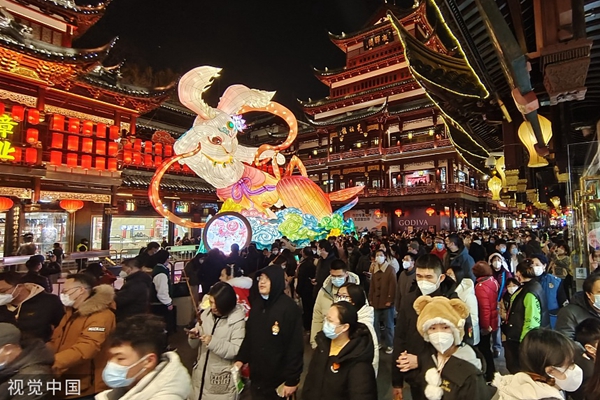
People visit the Yuyuan Garden in Shanghai on Jan 7, 2023. [Photo/VCG]
Life returns to pre-pandemic activity in many places as restrictions lifted
The first week following China's downgraded management of the novel coronavirus infection on Sunday has seen an orderly and joyous return to normality across the country.
Cui Haoyuan, a 29-year-old in Beijing, said he felt like "reclaiming a sense of control over his life".
As a white-collar worker commuting daily across the city and frequently visiting tennis courts for practice and hanging out at various restaurants, he said that he is most happy with the scrapping of regular nucleic acid tests and the mandatory scanning of digital codes for entry into public spaces.
"Sometimes, I had forgotten to take a test or test results were not shown on my mobile phone on time, which would mess up my workout routines or time with friends," he said. "Now, such concerns have evaporated and it feels great to regain control of my life."
With the virus' management being lowered from Class A to Class B, local governments have stopped rolling out mass testing. However, elderly care and social welfare homes, as well as other facilities with vulnerable people, should continue to take nucleic acid or antigen tests, and visitors should present negative testing results.
"Neighborhoods are also asked to keep some testing booths to meet individuals' demands, and drugstores and online retailers should stock up on sufficient antigen tests," Chang Zhaorui, a researcher from the Chinese Center for Disease Control and Prevention, said during a recent news briefing.
The downgrade also means that local authorities have stopped isolating infected cases, tracking down close contacts and locking down affected areas.
These curbs had previously deterred Gan Liqing, a globe-trotting birder based in Shenzhen, Guangdong province, from traveling.
"There were so many uncertainties and possible hassles associated with a long-distance trip. What if I went out and was quarantined? What if my residential complex was locked down when I came back?"
On Monday, he made his first flight in nearly a year for a jaunt to observe a rare bird species reportedly seen in Wenzhou, Zhejiang province.
"The whole procedure — from boarding to landing at Wenzhou and taking a ferry to the island — was extremely smooth," he said. "It was an amazing feeling to be able to travel around freely."
However, he also noted that he is cognizant of the virus' threats to the elderly and would abide by personal protective measures.
"My parents who are in their 80s have not contracted the virus yet, so to this day we still avoid eating together," he said. "The virus is mutating and the risk of second infections is very real. I will try my best to avoid getting infected again while restoring my normal life as much as possible."
According to a raft of measures announced along with the downgrade, ramped-up efforts will be dedicated to building intensive care beds, surveying the health conditions of the elderly and other vulnerable groups and strengthening medical capacity in rural areas.
Liang Wannian, head of the National Health Commission's COVID-19 response expert panel, said that the key to virus control work at present is devoting resources to susceptible groups and key facilities, especially related to the elderly.
Despite the country's increasing preparedness for a surge in infections following eased curbs, Liang said pressure on hospital systems appears inevitable. He said triaged treatment protocols and prompt detection of at-risk groups can help relieve strain on hospitals and reduce severe cases and deaths.
Yang Fanchun, manager of an inn in Lijiang, a famed tourist city in Yunnan province, said that he finally felt ready to break ground on a new hotel in the neighboring city of Shangri-La.
"I had shelved the idea for a few years, especially after the virus broke out because of so many uncertainties, such as potential disruption caused by blocked roads or sealed-off scenic spots and unpredictable tourism demands," he said.
"But now, it feels like all the clouds have cleared and so I finally made up my mind to dedicate time and money to the project."

